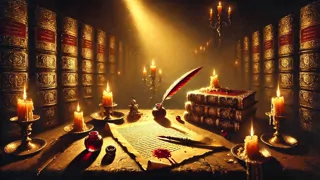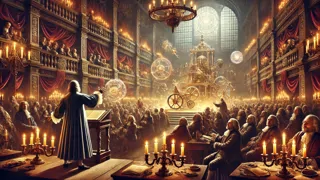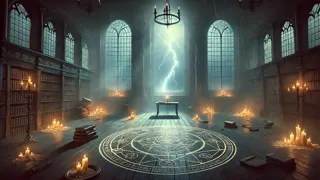Introduction
The cobblestone streets of Wittenberg, brushed by the chill of early autumn, hummed with the soft echoes of horse carts and murmurs of students moving to and from the grand university. At the city’s heart, where gothic spires pierced a restless sky and cathedrals tolled against the edge of dusk, the scholar Johann Faustus gazed down from a solitary window. His study—crammed by bound tomes, anatomical sketches, celestial charts, and crucibles—was both a sanctuary and a prison. Faustus, a man whose intellect soared beyond classical boundaries, had tasted every philosophy, pored over every mystical treatise, and unlocked secrets that once seemed reserved for saints or sorcerers. Yet, a gnawing hunger filled him—a sense that human knowledge could not satisfy the world’s bitter riddles nor pierce the veils cast over nature’s most hidden workings. Ambition burned like a fever in his veins. His colleagues whispered in corners about the proud, insatiable doctor, while his own shadow followed late into the night, lengthened by candlelight and the ever-ticking clock. Faustus watched the world as if already departed from it. His faith, once taut as a taut string, now vibrated with discord and doubt: what, truly, was the limit of the possible? Between Latin prayers, alchemical experiments, and nights sleepless with reading, he often wondered if the magical and the mundane were not merely two faces of the universal order—waiting for a brave man’s touch to finally unite them. The moon rose, silvering the city as Faustus prepared the circle, the incantations, and the impossible yet necessary invocation that would shatter the limits of mortality forever.
The Pact in Candlelight
The silence after his invocation vibrated with a tension almost physical. There, in the candlelit chamber, Faustus traced the final sigil and recited the eldritch words he’d assembled from whispered monastic tomes and the cryptic marginalia of a condemned necromancer. The room stilled, flame tips shrank to blue pinpricks, and darkness swelled until the world seemed to tilt. Then, with a sudden shiver of space, a figure appeared at the circle’s rim—a presence at once mocking and strangely courtly. Mephistopheles stepped forward with the quiet confidence of centuries, draped in shadow and edge-light, his eyes living embers in his sharply drawn face.

Faustus, half-terrified, half-elated, forced his voice into steadiness. He demanded knowledge, pleasure, the unraveling of all nature’s secrets—no boundaries, no law, no god above his right to know. Mephistopheles smiled, a smile full of centuries of seeing mortals make the same mistake. “For twenty-four years, doctor,” he intoned, “all you desire: learning, delight, the mastery that humankind craves. And at the term’s end—your soul, paid in full.” No chains, just a signature in blood—red as the sunset that bled beyond the windows and, perhaps, just as inevitable.
The remainder of that night passed not in horror but with giddy anticipation. Mephistopheles revealed wonders: the philosopher’s stone’s true formula, the chemical bonds behind the fever that claimed kings, the hidden language that moved the planets. Faustus tasted wines from courts he’d only read about and saw, through conjured mirrors, empires rise and fall. When, in anxious hours, his conscience spoke in the voice of his old confessor, Mephistopheles’s velvet syllables easily drowned it out.
Wittenberg at dawn harbored a different Faustus: proud, cold, and now perpetually shadowed by the demon’s presence. Some days brought flashes of brilliance—treatises composed at a speed to shame the greatest human minds, discoveries that made other scholars worship, then fear, his intellect. Yet pleasure is blunted without challenge, and Mephistopheles, always lurking, played cruel games. Whenever Faustus reached the brink of despair, the demon conjured diversions: the ghost of Helen of Troy, feasts where the meat never spoiled, damsels and princes lost in mechanical laughter. Yet the more Faustus drank, studied, and tasted, the emptier his heart became.
Within months, Faustus shut himself from all but the demon, distant from friends and loves, haunted by the ticking clock beneath the extravagant gifts. He read into the nature of sin and forgiveness, desperate for a loophole. But Mephistopheles’s answers were always half-truths, designed to nurture despair. The legend of Faustus spread, but none suspected the real shadow behind his genius or the mounting burden inside a soul lashed by bargains.
Wonders and Descent
With the pact forged, a riot of wonder swept into the scholar’s days. Mephistopheles, now Faustus’s constant companion, opened the world at a gesture. Entire libraries collapsed into Faustus’s mind in a single night, granting him a wisdom more dazzling and terrible than any priest or emperor. He constructed automata that mimicked life so perfectly, his contemporaries called him the master of man’s imitation of God. He was invited to courts across Europe, dazzling with spectacles—levitating objects for jaded nobles, reading the futures of trembling monarchs, whispering the death dates of rivals. His name became a cipher for all that was brilliant, enigmatic, and faintly blasphemous.

Faustus soon discovered there was no limit to the pleasures Mephistopheles could procure. He feasted in golden halls, tasted luxuries spilled from the caravans of Cathay, and consorted with spirits who danced for hours in the phosphorescent glow conjured by his demonic aide. Yet satisfaction thinned, replaced by restlessness. No delight lasted, and every new joy tarnished just as quickly as it arrived. Days blurred into nights. Friends and students withdrew or were cast aside—their questions seemed paltry compared to the riddles he now unraveled. Whenever Faustus tried to reclaim a moment of simple happiness, Mephistopheles taunted him with reminders of his coming reckoning.
The world began to change its opinion. Once celebrated as a prodigy, Faustus became a byword for arrogance and dangerous pride. Innkeepers crossed themselves when he passed. Scholars whispered that he trafficked with devils, and some clergy even tried to confront him, only to be repelled by enigmatic arguments or by phantoms conjured to startle or drive them away. Even the university that had once reverenced him now looked for pretexts to disown his legacy.
Yet for all the shows of demonic grandeur, the hours of dazzling pleasure and power, despair clung to Faustus. In rare moments when Mephistopheles withdrew, shadows pressed close, and Faustus’s dreams tormented him with visions of the damned: men and women, faces twisted in agony, reached out from pits where knowledge had availed them nothing. Desperation drove him even deeper—Faustus tried to reverse the spell, to purchase indulgences, to pray. But Mephistopheles only laughed.
Not even love was granted him. He conjured Helen of Troy, whose beauty was said to have launched a thousand ships, hoping her embrace could still his haunted mind. The vision was flawless, but Helen’s eyes were empty, her kiss a torment: the specter of beauty, not its essence. In the heights of triumph and the nadir of despair, Faustus comprehended his error. His soul had become a field trampled by the hoofbeats of insatiable longing. Even at the highest pinnacle, the world seemed empty—except for the presence of Mephistopheles, whose every word was a drop of venom, whose every gift was laced with a fatal memory of the debt that would one day fall due.
Final Reckoning
As the twenty-fourth year crept to its close, the weight of the bargain bent Faustus beneath sleepless nights and a growing terror he couldn’t escape. The rewards of magic were as ash on his tongue. Even Mephistopheles, who had once played at cordiality, became more remote, his face now shadowed with hints of the inferno that waited. Faustus, gaunt and trembling, tried desperate acts: he sought the counsel of theologians, attempting once again to find absolution. The doors of the church closed against him. The priest’s words, half-muttered, offered little hope and less comfort. Alone, Faustus attempted penance, praying through bitter tears for forgiveness, but his faith, warped by years of pride and forbidden knowledge, could not reach the roots of his fear.

On the last night, as thunder rattled the streets and the storm-spattered windows shook, Faustus gathered his few remaining friends and confessed everything. Some implored him to repent, some to flee. But the circle had been drawn years before, and Mephistopheles’s power filled every empty space of Faustus’s soul. When midnight struck, the demon appeared—not in silks but in his true infernal majesty, crowned by a halo of flames, each movement echoing the sweep of eternal punishment.
Faustus fell to his knees, begging for a mercy he no longer believed he deserved. Scholars who later told the story would argue whether angels truly surrounded the room, repelled by his unconsummated repentance, or whether Faustus’s last moments were spent entirely alone except for the shade of his infernal master. Some say the walls bled, the air filled with unnatural howls, and a great wind smashed the doors wide as the demon took his due. At dawn, when the survivors ventured into the wrecked chamber, all that remained was a bloodstain on stone and the scent of brimstone both sweet and sickening.
The legend of Faustus outlived him by centuries. His legacy—a caution to every scholar who confuses knowledge with wisdom, and every soul tempted by short paths to glory—remained a whispered warning in lecture halls and candlelit studies across Europe. Mephistopheles faded into rumor, but the lesson endured: the price of overreaching is not just the soul’s damnation, but a loneliness more profound than any physical hell.
Conclusion
The legend of Dr. Faustus echoes far beyond Renaissance Wittenberg. His story—shaped by the feverish striving for knowledge, the honeyed promises of Mephistopheles, and the silent, damning march of the years—remains a mirror for anyone toiling at the cusp of what is possible and forbidden. The drama does not end at Faustus’s destruction, for every generation finds its own yearning for secrets best left untouched, its own tempter lurking just out of sight. What gives this myth enduring power is not simply the spectacle of hellfire and spectral visitations, but the sorrow of a heart divided: ambition without humility, brilliance without conscience. Faustus’s fate is a warning, not against curiosity, but against the arrogance that severs the search for truth from compassion, faith, and self-understanding. In cathedral cells and crowded theatres, attentive listeners still hear the crackling thunder and whispered bargains of legend, wondering what price they might pay, staring out from candlelit studies into the aching dark, searching for the boundary that would keep greatness from becoming ruin.

















